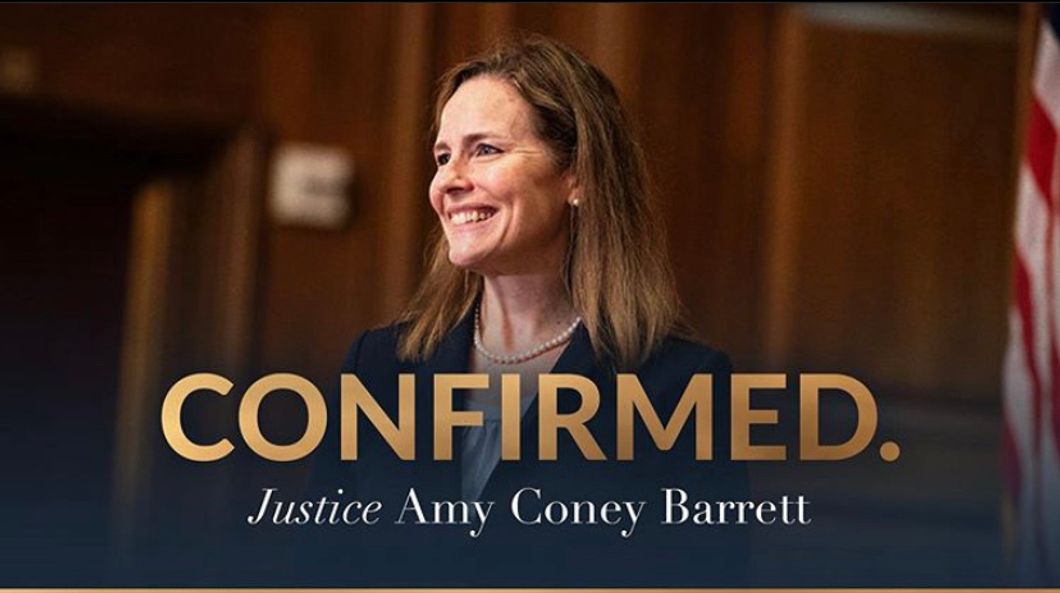On September 26, 2020, President Donald Trump officially announced Judge Amy Coney Barrett as the Associate Justice of the Supreme Court. As the first mother and fifth woman to serve on the Supreme Court, she is "an extremely talented lawyer and judicial writer" according to the City Bar. However, in regards to the issues that she fights for- she does not work to defend any women's rights. Her legal opinions on medical services, rape, and immigration proposes that she has no goal of supporting women in vulnerable circumstances, but instead will maintain the Trump's extreme right policies that are detrimental for women, especially those whom are disadvantaged.
Unlike other working mothers who struggled to raise their children, Barrett was born into privilege. Her father was a lawyer for Shell Oil Company, and she did not have to worry about financial issues because she could afford to pay for child care, which many working mothers could not afford to pay. Similar to many pro-life feminists, she stated that "supporting poor, single mothers would be the best way to reduce the number of abortions in the U.S," if Roe v. Wade decision was overturned- which allowed pregnant women to have abortions in the U.S. We can also assume that she would support the decision to revoke Roe. Portraying a facade as an ally to many activists, what has she actually done to provide women with security and support? Very little.
As Barrett denies her anti-feminist views, she continuously denies equality and fails to represent women. This is not feminism. Erika Bachiochi, a legal scholar specializing in Equal Protection elaborates:
Barrett embodies a new kind of feminism, a feminism that builds upon the praiseworthy anti discrimination work of Ginsburg but then goes further. It insists not just on the equal rights of men and women, but also on their common responsibilities, particularly in the realm of family life. In this new feminism, sexual equality is found not in imitating men's capacity to walk away from an unexpected pregnancy through abortion, but rather in asking men to meet women at a high standard of mutual responsibility, reciprocity and care.
Barrett's position is also celebrated by many Republicans. Republicans support her "women" credentials because 1) she is a woman and 2) she is a mother of seven children, none of which represents her as a feminist. Barrett's silence in response to many issues, such as birth control, contraception, and fertility treatment, speaks volume. Her position in the Supreme Court also jeopardizes equal pay, affordable child care, voting rights, and Planned Parenthood's health care rights, which is quite baffling. For decades, Planned Parenthood has provided patients with health and reproductive health services such as abortions and birth control; however, they, now, fear that it will all be taken away.
In a few cases, it is very evident where Barrett stands. As a 7th Circuit Judge, she ruled against abortion rights in the case of Planned Parenthood of Indiana and Kentucky, Inc v. Commissioner of the Indiana State Department of Health, No. 17-3163. Her stance supported the restrictions of women's access and right to abortion. In another case involving Doe V. Purdue, John Doe was accused of sexually assaulting his classmate; however, Barrett was more concerned about protecting the student's rights and defending against 'unfair bias'. She allowed the student to sue for alleged violations of the 14th Amendment and Title IX of the Education Amendments of 1972. Instead of protecting the victim's Title IX rights, she handled the school's efforts by attempting to establish vigorous measures against sexual assault as anti-male bias.
Now, we must ask: Will Barrett's efforts in the law only chip away at Ruth Bader Ginsburg's legacy? Will her perspective of conservative feminism target progressive policies that will instill a political or social change to represent the interests of Americans?

















